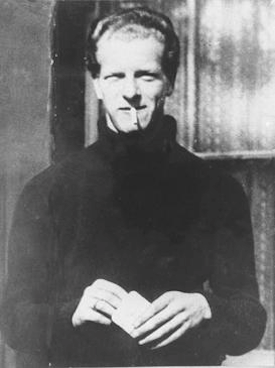The public was horrified. This was 1952 England: Robbers shooting policemen just didn’t happen. The trial was speedy and merciless. Under the “joint enterprise” doctrine, both boys were guilty of murder.
However, Craig was just 16. Too young to hang. He faced only juvenile detention (he was eventually released and lived into old age). It was Bentley who was sentenced to death, even though he was effectively under arrest when Craig committed the murder. If you can’t hang the one who fired, hang the one you can. Bentley was executed less than three months after the crime (in January 1953; capital punishment would not be abolished in England until 1965).
Ten years later, two other high-school dropouts were hanging around Croydon: my friend Ralph May and me. We were enrolled at a technical college, repairing some of the wreckage of our high-school careers. Ralph was doing somewhat better academically; I was more into music.
We were good friends, but after that year I moved to Germany as a professional rock musician and we lost touch. Five years later I gave up music, scraped admission to a university, earned a degree in linguistics, started work on my Ph.D., took a lectureship in London, and finally emigrated to California.
I saw Ralph just once, unexpectedly, in the years I worked in London. It was strange, like a mirage: He was on my TV screen. It was definitely him. He was performing his now classic song about homelessness and loneliness, “Streets of London,” which was at No. 2 on the pop charts. He was now Ralph McTell (having adopted the surname of Blind Willie McTell, who he greatly admired). He had obtained a recording contract and built a solid reputation as a folk singer and guitarist, and was selling out major concert venues. I never even knew.
Far away in California during the 1980s and 1990s I completely lost track of his career. But in 2011, after I had moved to the University of Edinburgh, one day I saw a poster saying that Ralph was coming to play the Queen’s Hall. Five minutes’ walk from my office.
I bought a ticket, and dropped off a note at the stage door. (“Remember me?”)
The performance was brilliant: superb fingerstyle guitar, and song lyrics rich with mature, evocative poetry. And after the gig we finally reconnected. The lost decades dispersed like morning mist; the friendship was back.
Now I’m in the audience every time his tours bring him to Edinburgh. After each concert he devotes an hour to a meet-and-greet with the long line of loyal longtime fans who want to hug him and share their news and buy CDs and take selfies with him. Then around midnight we finally slip away to a late-night hostelry to have a few beers together and catch up with each other’s lives.
We’re enormously lucky: both still working successfully in careers we love. Careers unimagined when we were teenage losers hanging out in Croydon. Luckier, for sure, than the two Croydon boys who set out to rob a candy warehouse on the night of Sunday, November 2, 1952.
Ralph’s mother knew the Bentley family. In 1981 Ralph wrote a ballad about Bentley and Craig (he performed it here in Edinburgh 10 days ago), and lent his support to a campaign to pardon Bentley. It eventually succeeded — a royal pardon in 1993 (40 years after the hanging), and an Appeal Court quashing of the murder conviction in 1998. (Too late for Bentley’s sister Iris, who died of cancer the year before. Ralph sang “Streets of London” at her funeral.)
The campaign for posthumous pardoning involved an early application of forensic linguistics: Malcolm Coulthard of Aston University argued that syntactic details of the confession supposedly dictated by the illiterate Bentley showed more similarities to written police English than to Bentley’s speech. Policemen like to put temporal connective adjuncts in postsubject position (I then proceeded …). Working-class boys never do. It’s an unexpected link to my research interest in syntax. Strange that both Ralph’s 50-year career and my very different one should link to the same Croydon tragedy.
